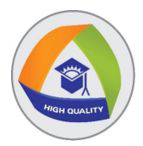NGSS to Issue Digital Badges for Great Science Content
- By Dian Schaffhauser
- 06/05/17
The organization behind the Next Generation Science Standards wants to pick up the pace of submissions of lessons and units by offering a new digital badge for those who participate successfully. Achieve, which introduced a peer review process for evaluating the quality and alignment of lessons and units to NGSS last fall, will issue the badge to individuals, schools, districts and other entities that develop and submit the material.

Up until recently, the push has been made to attract content that could be made available under a Creative Commons license; but the organization has also added a submission pathway for content developers that are working under "intellectual property constraints." If the development company agrees to make the materials "public and freely available," explained an NGSS statement, it can post the digital badge on the company's website right alongside the specific materials reviewed. Another stipulation is that the peer review panel's feedback must also be posted along with the reviewed materials. This would allow a curriculum producer, for example, to submit a lesson as an excerpt from a given resource to promote the caliber of its content.
The intent of the review board, which goes by the name, "Educators Evaluating the Quality of Instructional Products (EQuIP) Peer Review Panel," is to provide concrete examples of "high-quality" lessons, units and professional learning that support the use of NGSS in classrooms. Those lessons can help teachers and schools understand what NGSS looks like in practice. The panel works from a framework that provides a rubric for science lessons.
An explanation of the review process is available in this document on the NGSS website here.
Examples of highly rated content are available on this NGSS web page.
About the Author
Dian Schaffhauser is a former senior contributing editor for 1105 Media's education publications THE Journal, Campus Technology and Spaces4Learning.